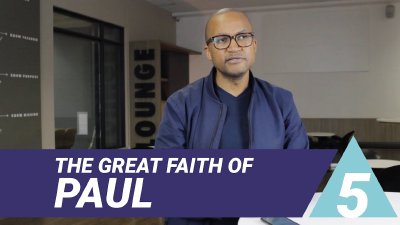


Great Faith
2019 Week of Prayer, Fasting, and Consecration
Introduction
Jesus encountered many people during his ministry with varying levels of faith. But there were two individuals that caused Jesus to commend them for having “great faith.” In Matthew 15, Jesus was drawing away from the crowds when a Gentile woman came running after him. Her daughter suffered from demon possession, and she pleaded for him to heal her. Jesus seemed to reject her request, saying, “I was sent only to the lost sheep of the house of Israel . . . It is not right to take the children’s bread and throw it to the dogs.” But she didn’t relent. She responded that even dogs received scraps. In response, Jesus not only granted her request, he publicly praised her: --- “Then Jesus answered her, ‘O woman, great is your faith! Be it done for you as you desire.’ And her daughter was healed instantly.” — Matthew 15:28 --- In another instance, Luke notes the time a Roman centurion sent Jewish elders on his behalf to ask for healing for his severely sick servant. He knew he was at a disadvantage as an officer of the Roman army. He considered himself unworthy to have Jesus come into his home. But he also used his position to explain why he believed Jesus could heal even from far away: “I too am a man set under authority, with soldiers under me: and I say . . . to my servant, ‘do this,’ and he does it.” Here’s how Jesus responded: --- “When Jesus heard this, he was amazed at him, and turning to the crowd following him, he said, ‘I tell you, I have not found such great faith even in Israel.’” — Luke 7:9 (NIV) --- Matthew used the Greek word “megas” to describe the Gentile woman’s faith. The word means “of considerable size, number, magnitude, or extent.” Luke used the Greek word *tosoutos* to describe the centurion’s faith. The word means “vast in quantity and amount; large; notably above average in size and magnitude.” In this guide, we will study men and women of great faith. They were people with significant flaws in their character and often made big mistakes in their life, but they all exhibited great faith. They were ordinary men and women, but they had confidence in an extraordinary God. Flawed and fallible but filled with faith. Let their lives inspire and provoke you to have great faith during this week of prayer, fasting, and consecration. Each day also features faith confessions adapted from God’s Word. Scripture constantly points to the strong connection between our faith and the words of our mouth. When the disciples asked Jesus to increase their faith, he told them, “If you have faith . . . you can say . . . ” (Luke 17:5–6, NIV). The author of Hebrews urged the saints to endure difficult times by holding fast to the confession of their faith (Hebrews 4:14). Paul said the very spirit of faith was connected to the words of our mouth. --- “It is written: ‘I believed; therefore I have spoken.’ Since we have that same spirit of faith, we also believe and therefore speak.” — 2 Corinthians 4:13 (NIV) --- May this guide help you develop a habit of meditating, speaking, and acting on the Word of God.
Preparation for the Fast
Genesis 15:1–6, Romans 4:19–21, Genesis 12:1–9
“He did not weaken in faith when he considered his own body, which was as good as dead (since he was about a hundred years old), or when he considered the barrenness of Sarah’s womb. No unbelief made him waver concerning the promise of God, but he grew strong in his faith as he gave glory to God, fully convinced that God was able to do what he had promised.” — Romans 4:19–21 Read: Abraham’s faith was an informed faith; it was not a faith divorced from reality. He weighed the facts carefully. He contemplated his own body. He recognized how old he was, and how barren Sarah was. He was aware of the odds against their having a child. But through his careful analysis, he never became weak in faith. The promise of God carried more weight than his circumstances—as hopeless as they seemed. “Under utterly hopeless circumstances he hopefully believed.” “Abraham did not shut his eyes to these unfavorable circumstances; he took them into careful consideration. But when he set them over against the promise of God, he found that the certainty of God’s ability and will to fulfill his promise outweighed them all.” Faith does not deny reality, but it does acknowledge that there is something more real: God’s Word. This is not always easy, especially when we are bombarded with contrary circumstances. But it is how faith works. As Martin Luther said: “It is a quality of faith, that it wrings the neck of reason and strangles the beast. But how? It holds to God’s Word, and lets it be right and true, no matter how foolish and impossible it sounds. So did Abraham take his reason captive and slay it, inasmuch as he believed God’s Word.” Apply: 1. What was so remarkable about Abraham’s faith as described by Paul in Romans 4:19–21? Why do you think that an informed and realistic faith is difficult for people to understand? Have you encountered the challenge of having to face facts squarely in the eye without losing faith? What did God teach you in those circumstances? 2. When was the last time you received bad news? How did you respond? How should you have responded? What can you do to ensure that the next time you hear bad news, you will respond in faith? Pray: *Adapted from Romans 4:20–21; Mark 9:23; Matthew 9:29, 17:20; Romans 1:17; 1 Timothy 6:12; Proverbs 6:21–22; Psalms 40:8, 119:89, 119:160, 138:2; Hebrews 10:16.* I respect the promises of God, and I do not waver in unbelief. I am strong in faith. I give glory to God. I am fully assured that what you promised, you are able to perform. All things are possible to me because I believe. It is done to me according to my faith. The righteous shall live by faith. I have faith the size of a mustard seed, and nothing is impossible to me. I fight the good fight of faith; I take hold of eternal life; I make the good confession. I bind your Word on my heart; I tie it around my neck. When I walk about, it will guide me; when I sleep, it will watch over me; when I awake, it will speak to me. I delight to do your will; your Word is within my heart. For you made this covenant with me; you put your Word upon my heart and wrote it upon my mind. Your Word is settled forever in heaven. You have magnified your Word according to your name. The sum of your Word is truth, and every one of your righteous ordinances is everlasting. Memorize: “Now faith is the assurance of things hoped for, the conviction of things not seen.” — Hebrews 11:1 Great faith confronts adversity and overcomes it with the Word of God. “THE FIRST TOOL GOD HAS GIVEN US TO STRENGTHEN OUR FAITH IS THE BIBLE . . . IF OUR FAITH ISN’T ROOTED IN THE BIBLE, IT WILL WITHER LIKE A PLANT PULLED OUT OF THE SOIL.” —Billy Graham, American Evangelist
Day 1
Hebrews 11:11, Genesis 18:9–15, Genesis 21:1–7
“By faith Sarah herself received power to conceive, even when she was past the age, since she considered him faithful who had promised.” — Hebrews 11:11 Read: Translated, the word “considered” means, “to think about carefully and thoroughly to form a proper judgment.” Sarah carefully and thoroughly thought about the faithfulness of God, and the result was faith—total confidence in God’s character. “The writer here chose to introduce his first heroine of faith, one who was able to overlook the physical limitation of her own barrenness to become a fruitful mother. Her faith, in fact, contributed to the startling multiplication of her husband’s seed, when old Abraham was as good as dead.” A television program preceding the 1988 Winter Olympics featured blind skiers training for slalom skiing. Paired with sighted skiers, the blind skiers learned on the flats how to make right and left turns. After that, they learned to navigate the slalom slope in the same manner. As they trusted and obeyed the sighted skiers, they were able to cross the finish line. They depended solely on the sighted skiers’ word. It was either trust or catastrophe. We are the blind skiers attempting to navigate the slopes of life. But fortunately, we have a faithful guide directing us. If we trust him, we will finish the course. And we can trust him because he is faithful and perfect in integrity. Integrity is a rigid, unyielding, and steadfast adherence to the truth. Faith is impossible without it. Because God is perfect in integrity, we have a strong foundation for our confidence in God. Apply: 1. Total trust in God’s character results in complete confidence in his Word. Recount how you have encountered the faithfulness of God firsthand. 2. Constant meditation on God’s Word produces faith, obedience, and success. But it is not always easy to do. What are some of the obstacles you face that hinder you from meditating on God’s Word? What is one action step you can take immediately to start increasing the amount of time you spend meditating on God’s Word? Pray: *Adapted from Proverbs 3:5–6; Psalms 125:1, 1:1–3, 112:7, 118:6; Hebrews 4:14, 10:23, 3:1; Deuteronomy 30:11, 14.* I trust in you with all my heart, and I do not lean on my own understanding. In all my ways I acknowledge you. You will make my paths straight. For those who trust in you are as Mount Zion, which cannot be moved but abides forever. Blessed is the man who trusts in the Lord. My delight is in the law of the Lord, and in his law I meditate both day and night. I am like a tree planted by the water; I will not fear when the heat comes. I am not anxious in a year of drought, and I continue to yield fruit. I will never be shaken. For my heart is steadfast, and I will not be afraid. What can man do to me? Because I have a great high priest who has passed through the heavens, Jesus the Son of God, I hold fast the confession of my faith without wavering. Jesus is the Apostle and High Priest of my confession. His commandment is not too difficult for me, nor is it out of reach. But the word is very near me, in my mouth and in my heart, that I should observe it. Memorize: “And without faith it is impossible to please him, for whoever would draw near to God must believe that he exists and that he rewards those who seek him.” — Hebrews 11:6 Great faith focuses on the faithfulness of God. “NEVER BE AFRAID TO TRUST AN UNKNOWN FUTURE TO A KNOWN GOD.” —Corrie Ten Boom, Dutch War Hero and Author
Day 2
Exodus 12:29–42, Acts 7:20–36, Hebrews 11:24–27
“By faith Moses . . . considered the reproach of Christ greater wealth than the treasures of Egypt, for he was looking to the reward. By faith he left Egypt, not being afraid of the anger of the king, for he endured as seeing him who is invisible.” — Hebrews 11:24–27 Read: On July 4, 1952, long-distance swimmer Florence Chadwick dove into the Pacific Ocean off Catalina Island. She planned to swim the twenty-plus miles to the California coast. But the conditions that day were not in her favor. The water was icy and the fog nearly impossible to see through. Several times her team drove sharks away with rifle fire. She could barely even see the boat she was following. After fifteen hours in the water, she gave out. Her trainer urged her on, but all she could see was fog. She quit—one mile from her goal. She said later, “If I could have seen the land I might have made it.” Two months later in clear weather, Florence swam the channel successfully, setting a new speed record. There was no fog, and she could clearly see her goal. Because the land was in sight, she endured to the end. Faith is like that. When the promises of God are clear, we can endure—despite the obstacles that are before us. Moses faced the anger of the king and the reproach associated with the people of God. But he endured to the end because he saw him who is invisible. The consequences he was facing did not daunt him. The promises of God may be unseen to the natural eyes, but they are perceived by the eye of faith. These promises are eternal, unchanging, and permanent. For heaven and earth will pass away, but God’s Word stands forever. Apply: 1. Hope is a clear picture of what God wants to do in and through your life. The clearer the picture, the stronger your hope. How clear is your picture and how strong is your hope? What can you do to strengthen it? 2. We inherit the promises through faith and patience. What specific promise from God are you waiting on at this time? What are the challenges you are facing as you wait? How can you encourage yourself to continue to hold onto God’s promise while you wait? Pray: *Adapted from 1 Corinthians 15:58; Hebrews 6:12; Romans 5:3–5; Galatians 6:9; Hebrews 12:1–3; Colossians 1:11; Psalms 62:2, 112:7–8; Ephesians 6:11.* Because Jesus Christ gives me the victory, I am steadfast, immovable, always abounding in the work of the Lord, knowing that my toil in the Lord is not in vain. I am not sluggish, but I imitate those who, through faith and patience, inherit the promises. I rejoice in tribulation because it brings perseverance, and perseverance proven character, and proven character hope, and hope does not disappoint. I do not lose heart in doing good, and in due season I will reap—because I do not grow weary. I run the race with endurance by fixing my eyes on Jesus, who, for the joy set before him, endured the cross. I do not grow weary and lose heart. I am strengthened with all power to have great endurance and patience. I will never be shaken. I do not fear evil tidings. My heart is steadfast trusting in you. My heart is upheld; I do not fear. I will look with satisfaction on all my enemies. I stand firm against the schemes of the devil. Memorize: “And we desire each one of you to show the same earnestness to have the full assurance of hope until the end, so that you may not be sluggish, but imitators of those who through faith and patience inherit the promises.” — Hebrews 6:11–12 Great faith sees the promises of God. “FAITH IS TO BELIEVE WHAT YOU DO NOT SEE; THE REWARD OF THIS FAITH IS TO SEE WHAT YOU BELIEVE.” —Augustine of Hippo, Fourth/Fifth Century North-African Theologian
Day 3
Numbers 13:1–2, Numbers 17—33, Numbers 14:1–9, Numbers 20—24, Joshua 14:6–15
“But Caleb quieted the people before Moses and said, ‘Let us go up at once and occupy it, for we are well able to overcome it.’ Then the men who had gone up with him said, ‘We are not able to go up against the people, for they are stronger than we are.’ So they brought to the people of Israel a bad report of the land that they had spied out, saying, ‘The land, through which we have gone to spy it out, is a land that devours its inhabitants, and all the people that we saw in it are of great height. And there we saw the Nephilim (the sons of Anak, who come from the Nephilim), and we seemed to ourselves like grasshoppers, and so we seemed to them.’” — Numbers 13:30–33 Read: This historical event took place around 1450 BC. Moses had recently delivered God’s people from Egyptian slavery and was now attempting to take them into the promised land. God had given the people a promise. They had a covenant with him. The land was theirs. But there was a problem: there were giants in the land. There are always giants in the land. There are always obstacles standing in the way of the promises of God. Henry Ford once said, “Obstacles are those frightful things you see when you take your eyes off your goals.” That quote would be more accurate if it was rewritten to say, “Obstacles are those terrible things you see when you take your eyes off God’s Word.” The people of Israel did not enter the land because they believed in the giants more than they believed in the promise of God—unlike Caleb. God’s testimony concerning his faith was: “But my servant Caleb, because he has a different spirit and has followed me fully, I will bring into the land into which he went, and his descendants shall possess it” (Numbers 14:24). Caleb gave us an example to follow. He declared God’s promises even when faced with overwhelming obstacles. We all have our own personal giants that continually try to deter us from our promised land. But if we follow the faith of Caleb, we too will overcome every obstacle. Apply: 1. Unbelief shows up in so many ways in our lives: worry, fear, doubt, and anxiety. Why are these forms of unbelief such an insult to God? What does it say about his character? 2. What are the main giants in your life right now that are keeping you from inheriting your promised land? What will you do to defeat them? Pray: *Adapted from 1 John 4:4, 5:4; Philippians 4:13; 1 Timothy 6:12; 2 Corinthians 4:13; Ephesians 6:10, 6:16; Romans 8:37; 2 Corinthians 2:14; Mark 9:23; Hebrews 10:35–39.* Whatever is born of God overcomes the world; and this is the victory that has overcome the world—my faith. I am born of God, and I overcome the world. I can do all things through Christ who makes me strong. I fight the good fight of faith. I take hold of eternal life. The spirit of faith is upon me. I am strong in the Lord and in the strength of his might. I take up the shield of faith to extinguish all the flaming arrows of the evil one. I am more than a conqueror through him who loves me. He always leads me in his triumph in Christ and manifests through me the sweet aroma of the knowledge of him in every place I go. All things are possible to me because I believe. I do not throw away my confidence, which has a great reward. For I have need of endurance, so that when I have done the will of God, I will receive what was promised. “For yet in a very little while, he who is coming will come, and will not delay. But my righteous one shall live by faith; and if he shrinks back, my soul has no pleasure in him.” I am not of those who shrink back to destruction, but of those who have faith to the preserving of the soul. Memorize: “For everyone who has been born of God overcomes the world. And this is the victory that has overcome the world—our faith.” — 1 John 5:4 Great faith declares God’s promises even when facing great obstacles. “THE MAN WHO IS NOT THOROUGHLY PERSUADED . . . RESEMBLES A WAVE OF THE SEA; HE IS IN A STATE OF CONTINUAL AGITATION; DRIVEN BY THE WIND, AND TOSSED: NOW RISING BY HOPE, THEN SINKING BY DESPAIR.” —Adam Clarke, British Methodist Theologian and Bible Scholar
Day 4
Joshua 6:15–25, Hebrews 11:31, James 2:24–26, Joshua 2:1–21
“By faith Rahab the prostitute did not perish with those who were disobedient, because she had given a friendly welcome to the spies.” — Hebrews 11:31 Read: Rahab was a temple prostitute and an innkeeper. But when she heard the report of how God dried up the Red Sea, she declared to the Hebrew spies, “The Lord your God, he is God in the heavens above and on the earth beneath.” She took a great risk and hid the spies. If the king had discovered the spies in her home, it would have cost her life and the life of her family. But she trusted God even at the risk of losing everything. Charles Blondin (1824–1897) was one of the greatest circus acrobats of all time. He performed many dangerous feats during his career, but the most outstanding were his exhibitions on an 1,100-foot-long tightrope stretched 160 feet above Niagara Falls. He crossed the Falls several times, always with different theatrical variations: blindfolded, on stilts, pushing a wheelbarrow. Once, he even sat on the tightrope and cooked an omelet. But his first crossing stands out above all the others. After successfully crossing Niagara, Blondin asked the gathered crowd, “Who believes I can cross back over the Falls?” The crowd roared as one, “We believe!” “Then who,” Blondin said, “is willing to get on my back while I cross?” The crowd was silent. Finally, one brave man stepped out of the crowd and said, “I will.” He climbed on Blondin’s shoulders, and they both walked successfully over Niagara Falls. The crowd at Niagara Falls mentally assented to Blondin’s ability to cross, but the brave man who climbed on his shoulders believed from his heart. Apply: 1. God uses situations to reveal to us that what we thought was faith was only mental assent. What situations have you been in the last year that showed you how much mental assent you had? What did God teach you through those situations? What does it mean to respond in true Bible faith and not with mere mental assent? 2. People of faith make quality decisions based on the Word of God. What situation are you facing right now that requires a quality decision? What are the obstacles hindering you from making the decision, and how will you overcome them? Pray: *Adapted from Numbers 6:24–26; Psalms 5:12; Ezra 7:28; Luke 1:28; 2:52; Mark 11:22–23; James 1:17; Luke 12:32; Psalms 23:6.* The Lord blesses me, and keeps me; the Lord makes his face shine on me and he is gracious to me. The Lord lifts up his countenance upon me, and gives me peace. He blesses the righteous and surrounds me with favor like a shield. I take courage, for the hand of the Lord my God is on me. The Lord is with me. I keep increasing in wisdom and stature and in favor with God and man. I have faith in God. I speak to mountains and I do not doubt in my heart, but believe that what I say is going to happen, and it shall be. Every good thing and every perfect gift is coming to me from the father of lights. I am not afraid for my father has gladly chosen to give me the kingdom. Surely goodness and lovingkindness will follow me all the days of my life, and I will dwell in the house of the Lord forever. Memorize: “For by grace you have been saved through faith. And this is not your own doing; it is the gift of God, not a result of works, so that no one may boast.” — Ephesians 2:8–9 Great faith trusts God even at the risk of losing everything. “THE DOER IS HE WHO FROM THE HEART EMBRACES GOD’S WORD AND TESTIFIES BY HIS LIFE THAT HE REALLY BELIEVES, ACCORDING TO THE SAYING OF CHRIST, ‘BLESSED ARE THEY WHO HEAR GOD’S WORD AND KEEP IT.’” —John Calvin, French Theologian and Protestant Reformer
Day 5
Acts 16:16–40, Acts 21:10–15, Acts 27:21–25, 2 Timothy 4:6–8
“Since they had been without food for a long time, Paul stood up among them and said, ‘Men, you should have listened to me and not have set sail from Crete and incurred this injury and loss. Yet now I urge you to take heart, for there will be no loss of life among you, but only of the ship. For this very night there stood before me an angel of the God to whom I belong and whom I worship, and he said, “Do not be afraid, Paul; you must stand before Caesar. And behold, God has granted you all those who sail with you.” So take heart, men, for I have faith in God that it will be exactly as I have been told.’” — Acts 27:21–25 Read: Acts 27 tells about Paul’s near-fatal shipwreck. He had appealed to Caesar and was being transported to Rome as a prisoner. But it was too late in the year for safe passage on the Mediterranean, and the ship was caught in a raging storm. For fourteen days, the ship was tossed on the sea until the men gave up all hope of survival. Paul was a prisoner on the ship, but he had a word from God. He stood boldly on the deck of the ship in the middle of the catastrophic storm and spoke God’s word with confidence. He gave a good report in the middle of severe circumstances. In any storm of life, we should follow Paul’s example. Find out what God has said about our storm, and then boldly proclaim it without wavering. It will turn out for us just as he said. The American war hero Lieutenant General Lewis “Chesty” Puller was the most decorated marine in history with over fifty-two medals. Even though he retired from active duty in 1955 and died in 1971, it is still a common occurrence for marines in boot camp to end the day with the chant, “Good night, Chesty Puller, wherever you are!” His confidence in battle was a constant encouragement to his men. One time, when his aggressive tactics had caused the enemy to surround his unit, he uttered the words he is most well-known for, “They’re on our left, they’re on our right, they’re in front of us, they’re behind us . . . they can’t get away this time!” That is the ultimate good report. Apply: 1. Faith takes an aggressive attitude towards God’s promises. How does your faith rank on the passive/aggressive scale? Are you as aggressive in laying hold of God’s promise as you should be? Why? What can you do to increase your aggressiveness? 2. Some people find it harder than others to give a good report. What is your tendency when faced with potentially negative circumstances? Why? Pray: *Adapted from Ephesians 1:3; Deuteronomy 28:2–13; Mark 11:24; John 14:13–14, 15:7, 16:23–24; Matthew 21:22; 1 John 5:14–15.* I am blessed with every spiritual blessing in the heavenly places in Christ. All these blessings come upon me and overtake me. I am blessed in the city and blessed in the country. I am blessed when I come in and blessed when I go out. I am blessed in my offspring. I abound in blessings. All the work of my hands are blessed. I am the head and not the tail, and I am above and not underneath. All things for which I pray and ask, I believe I have received them, and they are granted to me. I abide in him, and his words abide in me; I ask whatever I wish, and it is done for me. Whatever I ask in his name, he will do, that the father may be glorified in the son. If I ask him for anything in his name, he will do it. And everything I ask in prayer, believing, I shall receive. If I ask the father for anything, he will give it to me in Jesus’ name. I ask and I receive, that my joy may be made full. This is the confidence I have before him: that if I ask anything according to his will, he hears me. And if I know that he hears me in whatever I ask, I know that I have the requests which I have asked from him. Memorize: “For with the heart one believes and is justified, and with the mouth one confesses and is saved.” — Romans 10:10 Great faith gives a good report even when the circumstances look bad. “BY FAITH IN CHRIST A PERSON MAY GAIN SUCH SURE AND SOUND COMFORT, THAT HE NEED NOT FEAR THE DEVIL, SIN, DEATH, OR ANY EVIL. ‘SIR DEVIL,’ HE MAY SAY, ‘I AM NOT AFRAID OF YOU. I HAVE A FRIEND WHOSE NAME IS JESUS CHRIST, IN WHOM I BELIEVE. HE HAS ABOLISHED THE LAW, CONDEMNED SIN, VANQUISHED DEATH, AND DESTROYED HELL FOR ME. HE IS BIGGER THAN YOU, SATAN. HE HAS LICKED YOU, AND HOLDS YOU DOWN. YOU CANNOT HURT ME.’ THIS IS THE FAITH THAT OVERCOMES THE DEVIL.” —Martin Luther, German Priest and Leader of the Protestant Reformation
Breaking the Fast
John 11:17–21, John 11:38–44, Matthew 9:27–31, Mark 5:21–43
“And when Jesus had crossed again in the boat to the other side, a great crowd gathered about him, and he was beside the sea. Then came one of the rulers of the synagogue, Jairus by name, and seeing him, he fell at his feet and implored him earnestly, saying, ‘My little daughter is at the point of death. Come and lay your hands on her, so that she may be made well and live.’” — Mark 5:21–23 Read: A large crowd had gathered around Jesus expecting a miracle. They had come from miles around, bringing their sick with them. They were all watching, waiting, and hoping. But through the middle of the crowd came a man who could not wait. His daughter was dying, and he was determined to have Jesus heal her. “She will be healed,” he said. Jairus was certain. He placed his entire confidence in what God had said. Jesus began to follow Jairus when they were met by men with news from home. “Your daughter is dead. Why trouble the Teacher any further?” Ignoring the bad report, Jesus said to Jairus, “Do not fear, only believe.” Jairus did what Jesus said, and before the day was over he was eating a meal with his healthy daughter. John Paton (1824–1907) spent forty-five years as a missionary to the New Hebrides in the South Pacific. While translating the New Testament into the native language, he struggled to find a word he could use for faith. The natives were cannibals with no concept of grace. But then one day a native ran up the stairs into Paton’s house, rushed into his study, and flung himself on a chair. He said to the missionary, “It is good to rest my whole weight in this chair.” Paton had found the word he would use for faith. Paton finished his translation, and later testified that the entire island had been won to Christ. Apply: 1. Our actions reveal what we believe. Describe a recent situation where your actions revealed your faith in God. Why did you respond properly to that situation? Describe another recent situation where your actions revealed your lack of faith in God. Why did you respond improperly to that situation? What did you learn from both situations that will help you the next time you face similar circumstances? 2. How would you rate your ability to wait on the fulfillment of God’s promises? Do you tend to be more patient or impatient? Why? What can you do to increase your patience? Pray: *Adapted from Proverbs 3:5–8, 4:20–22; Psalms 103:2–4, 107:20; Isaiah 53:4–5.* I give attention to his words; I incline my ear to his sayings. I do not let them depart from my sight; I keep them in the midst of my heart. For they are life to those who find them and health to my whole body. Bless the Lord, O my soul, and forget none of his benefits; who pardons all my iniquities, who heals all my diseases, and who redeems my life from the pit. He sent his word and healed me. I trust in the Lord with all my heart, and I do not lean on my own understanding. In all my ways I acknowledge him, and he will make my paths straight. I am not wise in my own eyes; I fear the Lord and turn away from evil. It will be healing to my body and health to my bones. Surely my griefs he himself bore, and my sorrows he carried. He was pierced through for my transgressions, he was crushed for my iniquities; the chastening for my well-being fell upon him, and by his scourging I am healed. Memorize: “Let us hold fast the confession of our hope without wavering, for he who promised is faithful.” — Hebrews 10:23 Great faith is placing your entire confidence in what God has said. “MANY GRAND DEEDS HAVE ALSO BEEN BORN OF FAITH, FOR FAITH WORKS WONDERS. FAITH IN ITS NATURAL FORM IS AN ALL-PREVAILING FORCE.” —Charles Spurgeon, English Baptist Preacher









